QUALCOMM, Inc. (NASDAQ:QCOM), commenced its ambitious plan to capture a big share of Intel Corporation’s (NASDAQ:INTC) 96% market hold of the server chip segment, with a Chinese joint venture.
The new venture will see the US-headquartered mobile chip maker work with one of China’s provincial governments, Guizhou to design and produce server chips for data centers.
The reason for Qualcomm’s collaboration with Chinese government is seen in the market reports by research firm, IDC.
$6 B by 2020
Giant online commerce platforms in China, like Alibaba Group Holding Ltd (NYSE:BABA), JD.Com Inc(ADR)(NASDAQ:JD) as well as Baidu Inc (ADR)(NASDAQ:BIDU) are expected to expand their services, leading to massive growth of the local server market. By 2020 the server market is expected to exceed $6 billion in China, even as the global server markets grew to $54.24 billion between the last quarter of 2014 and third quarter of 2015.
Baidu Inc (ADR)(NASDAQ:BIDU) was the first of the large Chinese technology players to seek out the ARM-based servers that QUALCOMM, Inc. (NASDAQ:QCOM) showcased in 2015. These servers are notably greener, with lesser emissions, in comparison to Intel Corporation (NASDAQ:INTC) carbon-emitting server chips, since they run on older technologies. Nearly, all of the gigantic data center service providers in the US, which run on Intel’s servers, are testing servers that run on ARM.
JV- Politically Right
But the most significant aspect of QUALCOMM, Inc. (NASDAQ:QCOM) joint venture with Chinese provincial government is its political correctness. The JV will be operated by subsidiary called the Guizhou Huaxintong Semi-Conductor Technology, with a total value of $280 million. Qualcomm will hold 45% stake, while the local government will hold 55% stake, and serve as a front for future investments. Qualcomm, which underwent a major restructuring exercise in 2015, has shed much of it mobile chip making business to concentrate on the larger market opportunity in server chips. It also has also drawn up agreements to receive royalties on many of the licenses it offers Chinese OEMs. However, it has been challenging for the chipmaker to get the OEMs to actually pay. Hence, the joint venture is expected to bring in much needed goodwill for Qualcomm to pursue its dream to tap the massive Chinese markets across chip segments.
Anthony Young
Latest posts by Anthony Young (see all)
- Samuel Nathan Kahn (Manchester, UK) – Fit to Run Finance Firm - July 31, 2021
- Quarashi’s Ticks the All the Right Boxes… Anonymously - July 16, 2021
- JETT Lifts Off in Miami Launch - July 16, 2021







